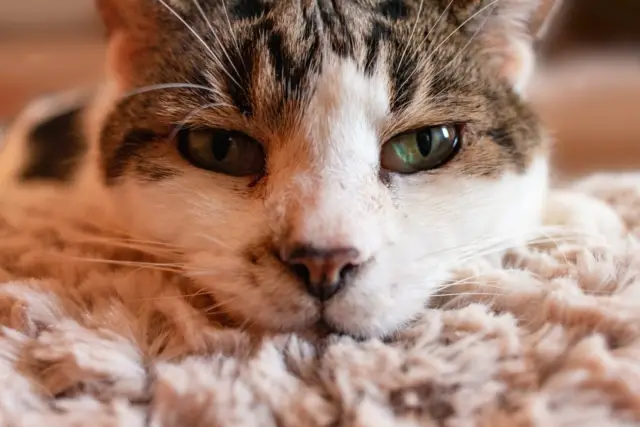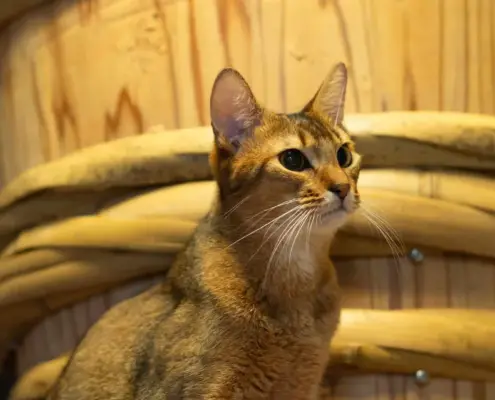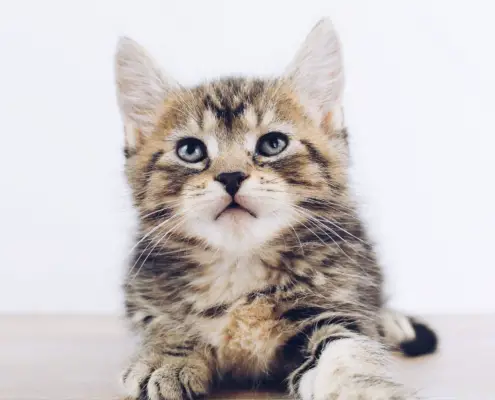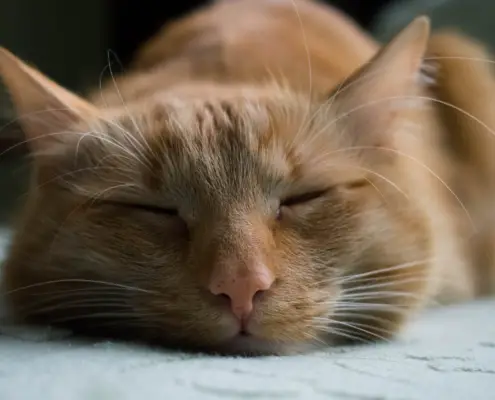
Hypertension, also known as high blood pressure, is a condition that can affect not only humans but also our feline companions. It occurs when the force of blood against the walls of the arteries is consistently too high. In cats, hypertension is often secondary to an underlying medical condition such as kidney disease, hyperthyroidism, or heart disease. It can also occur on its own, known as primary or idiopathic hypertension. Regardless of its cause, hypertension in cats can have serious consequences if left untreated.
Causes of hypertension in cats
There are several underlying causes that can lead to hypertension in cats. One of the most common causes is kidney disease. When the kidneys are not functioning properly, they can release hormones that constrict blood vessels, leading to increased blood pressure. Hyperthyroidism, a condition characterized by an overactive thyroid gland, can also contribute to hypertension in cats. The increased production of thyroid hormones can affect the cardiovascular system and elevate blood pressure.
Another cause of hypertension in cats is heart disease. When the heart is unable to pump blood efficiently, it can lead to a buildup of fluid in the body, including the blood vessels, resulting in increased blood pressure. Other potential causes include obesity, diabetes, and certain medications. It is important to identify the underlying cause of hypertension in cats to effectively manage the condition.
Symptoms of hypertension in cats
Recognizing the symptoms of hypertension in cats is crucial for early detection and treatment. Unfortunately, cats are masters at hiding signs of illness, making it challenging for pet owners to identify the problem. However, there are some common symptoms that may indicate hypertension in cats. These include:
- Sudden blindness: Hypertension can cause damage to the blood vessels in the eyes, leading to sudden blindness. If your cat appears disoriented or bumps into objects, it is important to seek veterinary care immediately.
- Behavioral changes: Cats with hypertension may exhibit changes in behavior such as increased irritability, restlessness, or aggression. They may also become more lethargic or withdrawn.
- Seizures: In severe cases of hypertension, cats may experience seizures. These can manifest as sudden muscle spasms, loss of consciousness, or uncontrolled shaking. Seizures are a medical emergency and require immediate veterinary attention.
- Increased thirst and urination: Hypertension can affect the kidneys, leading to increased thirst and urination in cats. If you notice your cat drinking more water than usual or having accidents outside the litter box, it is important to have them evaluated by a veterinarian.
Diagnosing hypertension in cats
Diagnosing hypertension in cats requires a thorough veterinary examination. Your veterinarian will measure your cat’s blood pressure using a specialized cuff and Doppler device. Multiple readings may be taken to ensure accuracy. In some cases, additional diagnostic tests may be recommended to identify the underlying cause of hypertension. These may include blood tests, urine analysis, and imaging studies such as ultrasound or X-rays.
It is important to note that cats can experience “white coat syndrome,” where their blood pressure may be elevated during veterinary visits due to stress. To account for this, your veterinarian may recommend multiple visits to confirm the diagnosis. Regular monitoring of blood pressure at home may also be recommended to ensure accurate readings.
Treating hypertension in cats
Once a diagnosis of hypertension is confirmed, treatment can begin. The primary goal of treatment is to lower blood pressure and manage any underlying medical conditions that may be contributing to hypertension. Medications are often prescribed to achieve this. Some common medications used to treat hypertension in cats include:
- Calcium channel blockers: These medications relax the blood vessels, allowing blood to flow more easily and reducing blood pressure.
- Angiotensin-converting enzyme (ACE) inhibitors: ACE inhibitors help dilate blood vessels and reduce the production of hormones that constrict blood vessels.
- Beta-blockers: Beta-blockers work by blocking the effects of adrenaline, which can help lower blood pressure.
The specific medication and dosage will depend on your cat’s individual needs and the underlying cause of hypertension. It is important to follow your veterinarian’s instructions and attend regular follow-up appointments to monitor your cat’s response to treatment.
Lifestyle changes to help manage hypertension in cats
In addition to medication, certain lifestyle changes can help manage hypertension in cats. These include:
- Weight management: Obesity can contribute to hypertension in cats. Maintaining a healthy weight through portion control and regular exercise can help reduce the risk of hypertension.
- Low-sodium diet: A low-sodium diet can help manage hypertension by reducing fluid retention and lowering blood pressure. Consult with your veterinarian for recommendations on appropriate cat food options.
- Stress reduction: Stress can elevate blood pressure in cats. Providing a calm and enriched environment, as well as engaging in play and interactive activities, can help reduce stress levels.
Monitoring and managing hypertension in cats
Once treatment begins, it is important to regularly monitor your cat’s blood pressure and overall health. Your veterinarian will recommend follow-up appointments to assess your cat’s response to treatment and make any necessary adjustments. Monitoring blood pressure at home may also be recommended, using a specialized cuff and Doppler device.
In addition to blood pressure monitoring, regular veterinary check-ups are essential to evaluate your cat’s overall health and identify any changes or complications. It is important to communicate any concerns or changes in your cat’s behavior or symptoms to your veterinarian promptly.
Preventing hypertension in cats
While not all cases of hypertension in cats can be prevented, there are steps you can take to reduce the risk. These include:
- Routine veterinary care: Regular check-ups and preventive care can help identify and manage underlying conditions that may contribute to hypertension.
- Healthy diet and exercise: Providing a balanced diet and ensuring regular exercise can help maintain a healthy weight and reduce the risk of hypertension.
- Stress reduction: Minimizing stressors in your cat’s environment can help prevent hypertension. Creating a calm and enriched environment, providing hiding spots, and avoiding sudden changes can all contribute to stress reduction.
Conclusion
Hypertension in cats is a serious condition that can have detrimental effects on their health if left untreated. Understanding the causes, symptoms, and treatment options for hypertension is crucial for early detection and management. Regular veterinary check-ups, monitoring blood pressure, and making necessary lifestyle changes can help prevent and manage hypertension in cats, ensuring a healthier and happier life for our feline companions. If you suspect your cat may have hypertension, it is important to seek veterinary care promptly for a proper diagnosis and treatment plan.
If you enjoyed my article, I would appreciate you sharing it with your network.

Sima Ndlebe
Sima writes for CatBuzz. He is interested in Cats, Health and Fitness, and Entrepreneurship.
Published: 12 October 2023
Related Articles
Disclaimer
The content found on CatBuzz.org is presented on an "as is" basis and is intended for general consumer information and education purposes only. Any utilization of this information is voluntary and solely at the user's own risk.
None of the articles or content should be regarded as, or used in place of, veterinary medical advice, diagnosis, or treatment. The information provided on the website is purely for educational and informational intentions and should not be considered a substitute for professional guidance from a veterinarian or other qualified expert. The articles are designed to inform consumers about veterinary healthcare and medical matters that may impact their cat's daily life. It should be noted that this website and its services do not constitute the practice of any form of veterinary medical advice, diagnosis, or treatment. CatBuzz.org explicitly disclaims any liability for any direct or indirect damages or losses that may arise from the use of or reliance on the information contained within the content.
Consumers must consult a veterinarian, veterinary specialist, or another qualified veterinary healthcare provider when seeking advice regarding their cat's health or medical conditions. It is important not to ignore, avoid, or postpone seeking medical advice from a veterinarian or other qualified veterinary healthcare provider solely based on information obtained from this website. If you believe that your cat may be experiencing a medical issue or condition, it is imperative to promptly contact a qualified veterinary healthcare professional.




